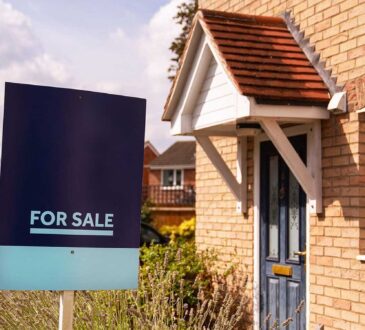
House prices in the UK have risen year-on-year for the first time in 13 months, signalling a recovery after last year’s property slump.
The UK’s largest building society, Nationwide, announced on Friday that UK house prices were 1.2% higher in February than during the same period in 2023.
Over the month, the lender said that costs are up 0.7%, meaning that the average house price has risen to £260,420 from £257,656 in January.
Friday’s data, which surpasses analysts’ expectations, points to an upturn in the UK housing market following limited demand last year.
“The Index shows the market casting off a lull from the winter and has the prospect of higher activity than previously expected,” said Mark Dyason, Founder of Edinburgh Mortgage Advice.
“This bodes well for the housing market with the impact of lowering interest rates and returning consumer confidence strengthening the market,” he added.
Renewed buyer demand is largely driven by a decline in mortgage rates seen at the start of the year.
Although the Bank of England’s base rate is still sitting at 5.25%, lender confidence improved in January as inflation cooled in 2023, prompting hopes of an imminent rate cut.
In tandem with reduced mortgage costs, buyer demand was also buoyed by real wage growth, low unemployment rates and a limited supply of new properties in the UK.
Will the momentum continue?
Some experts are nonetheless warning that the housing sector isn’t out of the woods just yet.
“The momentum of lower mortgage rates in January can only carry us so far,” said Sarah Coles, head of personal finance at Hargreaves Lansdown.
She added, “Stubborn inflation in 2024 meant during February the mortgage market had a bit of a re-think. The banks realised that they were getting ahead of themselves expecting imminent rapid-fire cuts, so they scaled back their expectations.”
“As a result, mortgage rates stopped dropping, and have been rising again. At the start of February, according to Moneyfacts, the average 2-year rate was 5.56%, and by the end of the month it was 5.75%.”
Yet although a continued rally in demand is uncertain in the coming months, there is some room for positivity when considering yearly improvements.
Last summer, two-year fixed mortgage rates in the UK rose above 6%, the highest level recorded since the 2008 financial crisis.
In contrast, the Bank of England confirmed yesterday that new mortgage approvals rose in January to their highest level since October 2022, a sign that loans are becoming more affordable.
Amy Knight of the financial comparison website, NerdWallet UK, was upbeat in her assessment, “Whilst 1.2% might seem small, after a year with no growth this news is not insignificant and may indicate that the housing market has turned a corner.”
Knight also noted that next week’s Budget announcement may be significant for those looking to buy a house.
“Many aspiring homeowners will be glued to their TVs and radios next Wednesday to hear whether or not the Chancellor confirms a rumoured 99% mortgage scheme.”
The aim of this policy is to help more individuals get on the housing ladder by allowing them to put down a 1% deposit on their first home, although some fear that stoked demand could ultimately make houses more unaffordable.




